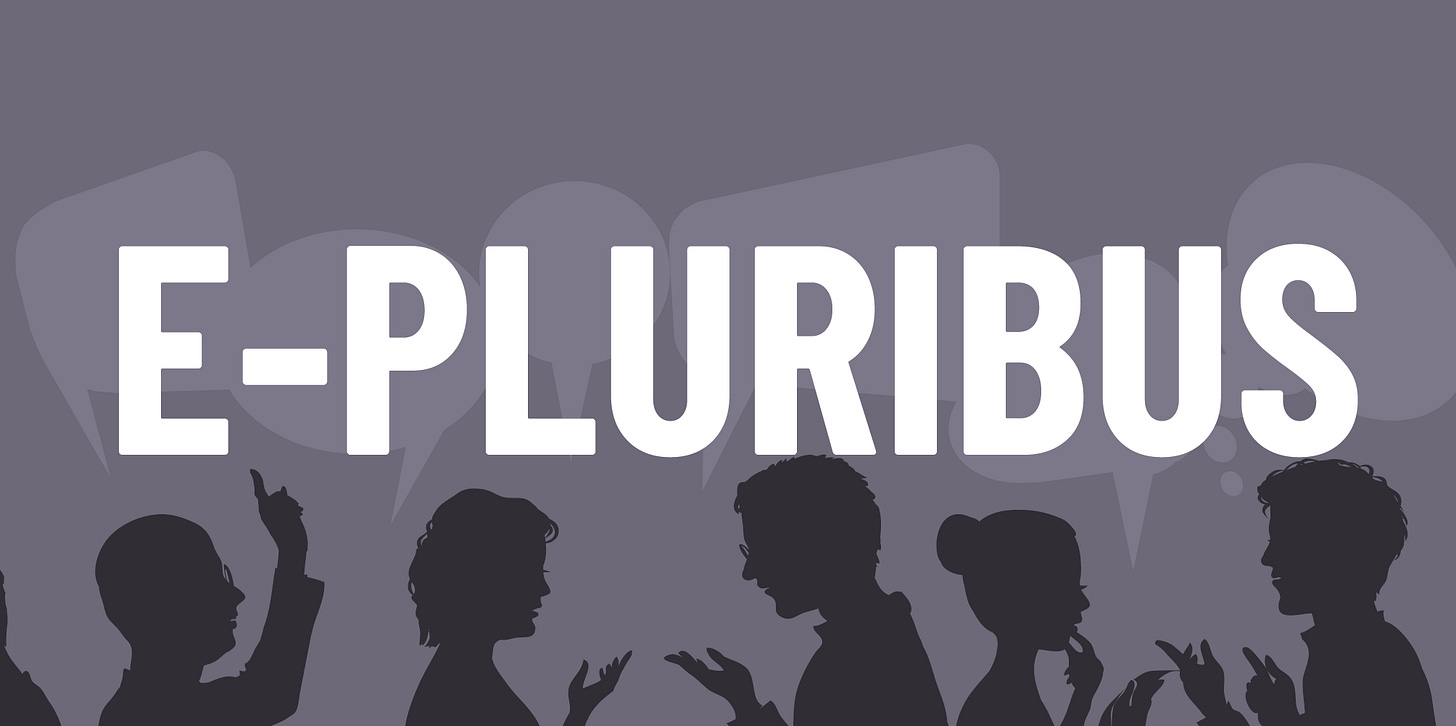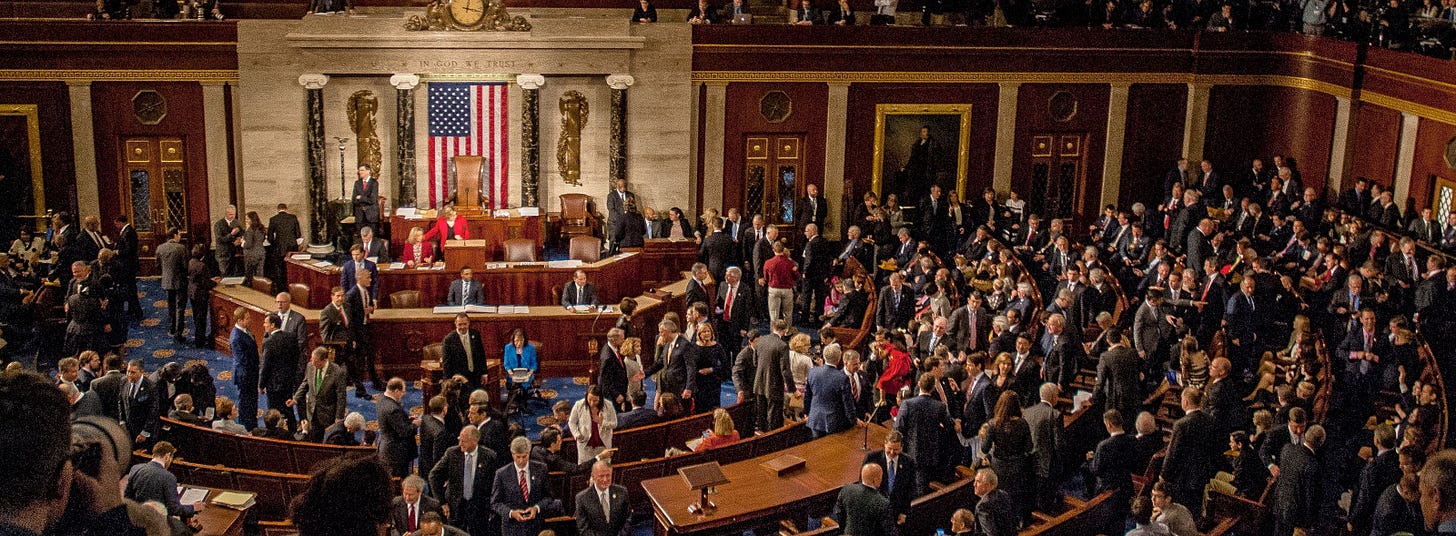E-Pluribus | January 5, 2023
Pluralists and zealots and politics, oh my!; increasing calls for social media censorship; and God bless this mess we call Congress.
A round-up of the latest and best writing and musings on the rise of illiberalism in the public discourse:
Ben Sasse: America’s True Divide: Pluralists vs. Zealots
Tuesday’s round-up included a David French essay on the twin threats of activism and apathy in American politics. Now in The Wall Street Journal, soon-to-be-former Senator Ben Sasse similarly pairs pluralists and zealots, though Sasse sees the latter as the threat to the kind of America pluralists are fighting for.
The [political] zealots thrive in the chaos of the current moment. We are living in a disrupted age. The Digital Revolution has shifted Americans’ technological, economic, geographic and cultural life, and our political disruption is the result of these changes in our ways of feeling and thinking.
Modern media, through myriad outlets at our fingertips, all of them small and narrowly targeted, has transformed Americans’ conception of community. As communications become more instantaneous, we’ve become siloed and more lonely. We know less about our neighbors and more about the viral nut jobs who reinforce our polarized political opinions. Social media, cable television and click-bait news amplify the angriest voices. This is a casino business model, trying to captivate audiences instead of informing them. Social algorithms run on rage. Good-faith arguments don’t go viral.
[ . . . ]
The good news is that the American people are bored by this and there’s a huge majority market for something better. Twitter isn’t real life, and cable television doesn’t represent the public. The vast majority of Twitter traffic is driven by less than 2% of the public. According to Pew, less than 6% of Americans generate 99% of political tweets. The programs of Tucker Carlson, Lawrence O’Donnell and Anderson Cooper draw prime-time audiences that sound impressive until you realize that together they account for less than 2% of the public.
Here’s more good news: Americans can and will break the outrage cycle by building institutions. The zealous central planners don’t own America’s future. This country belongs to the optimists, the innovators and the builders. The places where we’ll figure out what comes next are churches, schools, businesses and neighborhood associations.
Read the whole thing.
ICYMI: Matthew Harwood, Aaron Terr: Illiberal and ill-advised calls to censor social media intensify
In December, Matthew Harwood and Aaron Terr of the Foundation for Individual Rights & Expression detailed the various ways the government is trying to circumvent the First Amendment when it comes to social media. Though Twitter has gotten most of the attention lately, government officials have their sights set on the larger social media landscape as well.
And the calls for regulation have been bipartisan, making for strange bedfellows. In early December, Sen. Lindsey Graham said he would join forces with Sen. Elizabeth Warren to introduce legislation creating a new federal agency, the Digital Regulatory Commission, because social media “is out of control” and needs “to be regulated in some fashion.”
Not to be outdone, New York Mayor Eric Adams also got into the mix, calling on federal lawmakers to “take a higher role in how we look at social media” and arguing that the “social media industry must take a stronger role on dealing with hate.” Adams doesn’t have to appeal to his own state legislature, because it already passed an unconstitutional law — which FIRE is challenging in court — that requires social media platforms to address “hateful” speech. Meanwhile, New York’s attorney general is pushing for even more unconstitutional regulation of online speech.
What these government officials seem to forget is their utter lack of authority to demand that private platforms censor constitutionally protected speech.
[ . . . ]
The government can far too easily abuse these elastic categories simply to suppress unpopular and dissenting views, or speech that challenges official narratives. A free society allows all manner of speech not only because doing so protects freedom of thought and conscience, but also because it protects against an overzealous government determining what its citizens can see, say, and even think.
Read it all here.
Jonah Goldberg: So Congress is a mess. It’s supposed to be messy
Criticizing the workings (or non-workings) of Congress is almost as popular a pastime as complaining about the weather, but Jonah Goldberg writes in his latest for the Los Angeles Times that the current speaker battle in Congress is a sign things are working as intended. If politics “ain’t beanbag,” it ain’t neat and orderly either.
[T]he Pelosi model of governance is part of the problem. Yes, she was very effective, but her effectiveness came from a centralized, top-down approach — which has its historical roots in, among other things, Newt Gingrich’s “Contract With America” reforms in the early ’90s. This approach is one of the drivers of political dysfunction in Washington and the country.
Congress is supposed to be where politics happens. Representatives from different regions, with different interests, are supposed to hammer out legislative solutions from the ground up. Legislation should come at the end of a process of discovery, in committees empowered to weigh debates between competing experts and constituencies. This process builds consensus. It gives the public an opportunity to hear competing points of view and to be heard.
The Pelosi model reverses all of this. Legislative priorities — including huge undebated omnibus spending bills — are worked out almost entirely by the speaker and the Senate majority leader and then presented as a fait accompli to legislators, like unimprovable stone tablets. And because of the hyper-partisanship that Congress’ dysfunction helps fuel, legislators are expected to vote on a straight party line.
Worse, when some policy changes are too radical or unpopular to pass even on a party-line basis — such as forgiving billions in student debt — Congress simply asks (or allows) the executive branch to do it unilaterally with no legislative support or legitimacy whatsoever. This makes politics ever uglier and more zero-sum because it turns presidents into elected monarchs and leaves unelected judges as the only check on executive power.
Read it all.
Around Twitter
Via Jonathan Chait, the left eating its own who step out of line:
Excerpts from a long thread by the Washington Free Beacon’s Aaron Sibarium on some of the government’s diversity training documents obtained by the Wall Street Journal:
And finally, also via those documents obtained by the Wall Street Journal, the Department of Veterans Affairs utilizes . . . the Genderbread Person. Give it up, Babylon Bee.











